- Home
- David Downing
The Dark Clouds Shining Page 2
The Dark Clouds Shining Read online
Page 2
“They were still fifty yards away, and he had his back to them.”
“Indeed, but still . . . And I suppose in the end it doesn’t matter, because even if PC Standfast is being reticent with the truth, and everything happened exactly the way you say it happened, the fact remains that you struck a policeman in the course of performing his duties, and came remarkably close to killing him. And that no matter how offensive the alleged remark, there can be no excuse for what you did.”
The judge didn’t say he agreed, but the jury was left in no doubt of his expectations. McColl was barely back in the basement before being recalled; the eleven men and lone woman had taken less time than it took to smoke a cigarette. The guilty verdict was unanimous, and none of them looked in the slightest bit doubtful about its rightness.
“Jack McColl,” the judge began, “you have, as the learned member for the prosecution pointed out, an obvious affinity for violence. PC Owen Standfast was the victim in this instance, but two other police officers—as I am only now allowed to reveal—have suffered at your hands in the last eighteen months. Both in political demonstrations which, accidentally or not, descended into violence. Neither man suffered serious injuries, but perhaps they were simply more fortunate than PC Standfast.
“The disabled and disfigured veterans of the war have been a feature of this trial. They, and the treatment they receive from a mostly grateful society, are obviously of enormous importance, but this trial has not been about them. A simple act of violence—that is what this trial has been about, and you, Jack McColl, have been found guilty of committing it. In some ways you are a very lucky man, because if Owen Standfast had died, you would now be facing a probable life sentence, or even an appointment with His Majesty’s hangman. I was minded to give you ten years in prison, but have decided on reflection to reduce that by three, on account of your driving the victim to hospital. Take him down.”
With one last glare at McColl, the judge rose to his feet and headed for his chambers. McColl felt hands encasing both his arms, and allowed himself to be led from the dock and onto the stairs. He was vaguely surprised and somewhat aggrieved by the length of the sentence, but realized, with something of a shock, that his strongest feeling was one of relief.
Waifs and Strays
Sergei Piatakov had hoped that the Red Army train wouldn’t stop in the town where he’d grown up, because these days the past was something he mostly tried to forget. But here he was staring across at the old familiar platform and the snow-draped buildings that lay beyond. A short walk away, hidden by the curve of the main street, was the school where he’d taught. A verst beyond that, the house by the river where his family had lived.
The urge to see the place again was surprisingly strong, but the train would probably soon be on its way. And anyway, what would be the point? Everyone was gone, and all would be different. He certainly was.
Five years had passed since he’d left from that platform on another late winter afternoon. He, his mother, and Olesya had waited to say their teary good-byes under the canopy, watching the snow floating down to the tracks. The wall poster proclaiming that the kingdom of the proletariat shall never end certainly hadn’t been there that day, and the soldiers hadn’t been wearing caps with gleaming red stars. On the contrary, if memory served him right, a couple of priests had been telling a group of doomed young conscripts how lucky they were to be serving the beloved czar. Before, no doubt, scuttling home to the warmth and safety of their church.
He remembered Olesya making sure the top button of his navy greatcoat was securely fastened before she kissed him good-bye. He remembered his mother’s pale face and feverish eyes, and the brave smile she had just about managed to keep in place.
It was the last time he’d seen either of them. Now one was dead, the other in exile, God only knew where.
The train jerked into motion, stanching the flow of memories, blurring the picture inside his head. They were gone, he reminded himself, as the station slipped from sight. That world was gone.
And what had been put in its place? To say that the last five years had seen their ups and downs felt like the mother of understatements. The horror and despair of the czar’s war against the Central Powers had dissolved in the joyful hopes of the October Revolution, but they in turn had been all but swallowed up by the horrors of civil war. When that had been finally won the previous winter, the winners had found themselves deeply at odds with one another over how to proceed. And now, this very week, the sailors at the Kronstadt naval base—whom many had thought the heart, soul, and fist of the revolution—had come out against Lenin’s government.
Piatakov was no longer a sailor—these days the regime’s enemies were almost all on land—but he, his father, and his brother had all been stationed at Kronstadt at some time or other. He had traveled to and fro between the base and nearby Petrograd in the autumn of 1917, and been lucky enough to take part in the storming of the Winter Palace. He knew these men, and if they said the revolution had lost its way, he was inclined to believe them.
He certainly had no desire to fight them, and when the regiment had received its marching orders the previous evening, that distinct possibility had filled him with dread. But on reaching Velikiye Luki their train from the Polish border had continued eastward on the line to Moscow rather than north toward Petrograd, and soon thereafter new orders had been divulged. The rebellion in Tambov province, which they’d fought to subdue in the months before Christmas, was apparently still alive, and the regiment was headed back for a second tour of duty.
Which had to be better than fighting old comrades, but still seemed a less than inviting prospect. Piatakov had no sympathy for the mostly peasant rebels, who had no hope of victory, and whose barbaric depredations he had seen at first hand. His own side had often behaved just as badly, but who could afford bourgeois scruples when the towns were starving for lack of grain?
The things he had seen and done in his twenty-five years. Things he would have found unimaginable when he left for war that day. Things you did because the bastards clung to power and privilege like limpets, and had to be loosed, finger by finger, until they fell away.
He suddenly realized how hard he was gripping the corridor handrail.
Outside, the countryside was growing dark. They should be arriving in Moscow sometime tomorrow and, if the past was any guide, would probably not be setting off again for at least another twenty-four hours. He found himself hoping that the train would just keep going, because Moscow meant his wife, and these days he found his comrades-in-arms a much more comfortable fit. He still loved her, but he was far from sure that she still loved him or, indeed, ever had, at least in the way he’d once hoped for. These days they barely ever talked politics because both of them knew it would end in a row. And the problems they had in bed—the problems he had—certainly hadn’t helped.
He told himself that he was being foolish, that it would be good to see her, and that, anyway, it wouldn’t be for long.
Once he had only his own reflection to look at, he made his way back to the crowded compartment. With the windows shut against the cold, the tobacco fug grew ever thicker, but at least they could hear one another talk, and soon the usual debate was underway. Piatakov’s regiment had more than its fair share of revolutionary veterans, and not for the first time, abuses of power and position were the principal topic under discussion. Some thought the increasing stratification, and the uneven distribution of goods and privilege that went with it, were only teething troubles—that once the economy was back on its feet the party would find a way to restore the simple egalitarianism of the early years. Others were convinced that the revolution had been betrayed, as much by the party leadership as by the specialists they’d hired in such numbers, and that these new bosses would soon resemble the old unless the lower ranks fought back.
What neither side disputed was the proliferation of double standards. Severa
l other men had noticed the train that Piatakov had spotted in Polotsk station, with its luxury saloon for Lenin’s beloved specialists and overcrowded, run-down coaching stock for everyone else. Those specialists were the bourgeois gentlemen that Lenin had promised he would first squeeze dry and then cast aside. They hadn’t looked squeezed or fearful for their future.
Many soldiers had similar tales to tell. There was the brand-new workers’ sanatorium in Odessa, which had no worker patients, but was proudly shown to any visiting bigwigs. There were the dachas of long-vanished nobles in the woods around Moscow, which the government had confiscated in the name of the people, before erecting taller fences and gates. While in Petrograd, one of the soldiers had visited the Smolny Institute, where the October Revolution had been organized, and found himself in the midst of a bitter conflict over different canteens for different grades of party membership.
The general accord as to what had gone wrong didn’t extend to how things could or should be put right. Ever since the first revolution, stepping onto a train had usually also meant stepping into a highly animated discussion of political rights and wrongs. But in those early days, the debates would usually remain good-natured—people were genuinely intrigued by other possibilities, and not inclined to dismiss all opponents as merely self-interested. These days an argument was more likely to end in a brawl, as this one looked likely to do before an unscheduled stop gave everyone the chance to literally cool down.
Walking up the platform, Piatakov found himself with the teller of the sanatorium story. They knew each other by sight, but had never spoken before. The other man said he already knew Piatakov’s name, and that he was Vladimir Fyodorovich Sharapov.
“Are you really as pessimistic as you sounded?” Piatakov asked him.
Sharapov laughed. “I sometimes wonder that myself. I do think it will get a lot worse before it gets better. The Kronstadt sailors have seen to that.”
Piatakov was taken aback. “You think they’re wrong?”
“They’re right, and everyone knows they are, but our leaders can’t admit it. So they’ll make an example of them.”
“Will they find troops willing to go up against them?”
“Oh yes. The only ones that won’t are older regiments like ours.” His smile was bitter. “And look which way we’re heading.”
“But there must be another solution,” Piatakov said, hoping it was true. The acute sense of loss he was feeling suggested otherwise.
Sharapov just shrugged. “You know the party’s Tenth Congress is happening in Moscow?”
“Of course.”
“Well, the leadership will be announcing a new economic policy in a few days’ time. People will be free to trade again.”
Piatakov was more shocked than surprised. “How do you know this?” he asked, hoping it might be no more than a rumor.
“My brother works in the Economic Commissariat. They’ve been drafting the new regulations for weeks.”
Piatakov took a few moments to take this in. “But that sounds like they’re reintroducing capitalism,” he said eventually.
“That’s exactly what they’re doing.”
“But . . .”
“They think that as long as the party retains absolute political control, they can afford to lessen their economic grip. Give the bourgeoisie enough economic freedom to get everything moving again, but don’t let them get their hands on any political levers. A breathing space, a period of transition. That’s what they say we need.”
“You don’t believe it.”
“I don’t doubt that’s what they’re thinking. I don’t even question their good intentions. I do fear the consequences.”
“Dictatorship.”
“Of course. The more economic freedom you offer, the less you can risk any real democracy. We’ve seen it whittled away: the banning of other parties, even those with whom we shared a lot. Now there’s talk of banning factions in our own. Democracy’s like virginity—once it’s gone it’s gone. Can you imagine Lenin and the other leaders meeting a few years from now and deciding that powers should be handed back to the soviets or the unions or anyone else? It’s a fantasy. There won’t be any going back from this.”
Piatakov shook his head, but couldn’t deny a terrible sense of foreboding. “Is it really that hopeless?”
“Sometimes I think so, sometimes not. We can keep on arguing until they actually shut us up, and who knows? Miracles happen. We might even convince the men who matter. If we can’t . . .” He shrugged. “I have a wife and son to think about.”
Ten minutes later their train was on the move again, and this time running on a decent stretch of track. Piatakov arranged his body for sleep as best he could in the cramped space, and then went through his usual ritual of mentally reliving one of the many horrors he’d witnessed over the last two years. He chose the moment that he and a comrade had come across the commissar tied to the post, his eyes still showing signs of life, his entrails hanging out of his stomach, which was stuffed with the grain he’d been sent to requisition. This was the memory that often woke him screaming, and over the last few months he had convinced himself that reliving the experience while he was still awake made it less likely to haunt the sleep that followed.
The view from the small office window was surprisingly evocative, a wide expanse of grass sloping down toward the river, and the monastery sat on the bank beyond, white walls and golden domes set against the wall of birches, all beneath a pure blue sky. Moscow’s ragged streets seemed a world away, not a handful of versts.
The manager’s assistant, a woman of no more than thirty, was clearly unnerved by Yuri Komarov’s presence. This didn’t surprise the M-Cheka’s deputy chairman—few people instinctively reached for the samovar when the Bolshevik security police came to call. Most, in Komarov’s experience, were too busy trying to guess which of their activities had brought such dangerous visitors to their door.
The four men he had brought along looked almost as unhappy. They were standing around in the yard outside, smoking and staring moodily into space, all in their trademark leather coats. When he’d called them in that morning to explain the task at hand, the looks on their faces had suggested he’d lost his mind. When he had pointed out that higher authority had decreed that the Cheka take responsibility for Moscow’s large and ever-rising population of young waifs and strays, they’d rolled their eyes and offered muttered doubts about the Orgbureau’s collective parentage. Komarov had just smiled at them. He liked the idea of softening the Cheka’s image.
“I want to examine the facility,” he told the woman.
“All of it?” she asked.
Komarov nodded.
“I’d prefer the manager to be here.”
“So would I. But he isn’t, and we don’t have all day. So . . .”
She hesitated, failed to find a counterargument, and reached for a heavy bunch of iron keys.
“They’re locked in,” Komarov murmured as they crossed the hall. It wasn’t a question.
“Of course.”
“For how long each day?” he asked as they ascended the staircase.
“All but an hour. Each child is allowed a full hour’s exercise.”
“Like a prison,” Komarov said blithely.
The look on her face suggested she didn’t know how to take that comment. Most people would have considered it a statement of disapproval. But from a high-ranking Chekist? “We don’t have the staff to offer any more,” she said—unable was always a better excuse than unwilling. “If we let them out without sufficient supervision, they’d just disappear. And you’d have more gangs on the street to deal with.”
She unlocked the first door and stood aside for him to enter. About twenty girls, ranging in age from around seven to around fifteen, almost leaped to their feet. Most had been sitting behind a bewildering variety of prewar sewing machines;
the others had also been working on textiles in one way or another. An older girl had been sitting and facing the rest, an exercise book open in front of her. The smile she gave Komarov was about as genuine as a nine-ruble note. When he reached for the exercise book, she took an involuntary step backward.
The book contained the record of each girl’s work, the jobs she had done and the time it had taken.
Komarov placed it back on the desk, apologized for the interruption, and walked out onto the landing.
“The other rooms are no different,” the woman told him.
“Show me.”
There were three of them, huge bedrooms once, their intricate cornices all that was left of the life that the revolution had brought to an end. The girls were all doing much the same work as the ones in the first room.
“Is that it?” Komarov asked as they headed back down the staircase. He could imagine the previous owners on the lower steps, welcoming the guests in all their finery.
“There’s a laundry in the basement,” the woman admitted.
“Show me.”
It was damp and poorly lit, the stove apparently unused. The girls stood there and blinked at him, pale bare feet on the dark stone floor. It was like something out of Dickens, Komarov thought.
“Where do they sleep?” he asked as they climbed back up the stairs.
There was a dormitory out back. It had once been a stables, and each stall was fitted with three tiers of roughly built bunk beds. The small office next door, which had presumably belonged to the estate manager, was still in use, a table and chair by the only window, a bed that must have come from the house taking up most of the room.
“Who sleeps here?” Komarov asked.
“No one. Well, not on a regular basis. The manager sometimes spends the night here when he has a lot of paper work. At least, that’s what he told me,” she added, seeing the expression on Komarov’s face.
“How many staff are here at night?” he asked.

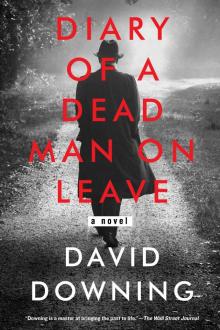 Diary of a Dead Man on Leave
Diary of a Dead Man on Leave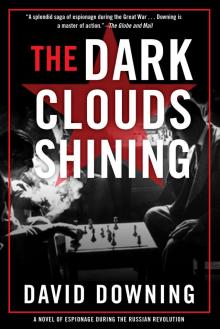 The Dark Clouds Shining
The Dark Clouds Shining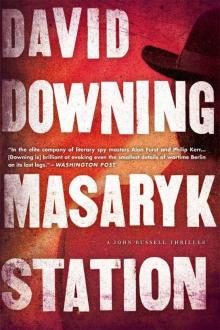 Masaryk Station (John Russell)
Masaryk Station (John Russell)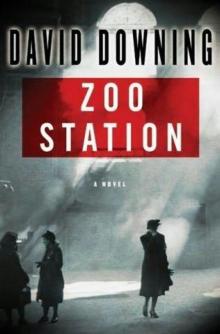 Zoo Stationee
Zoo Stationee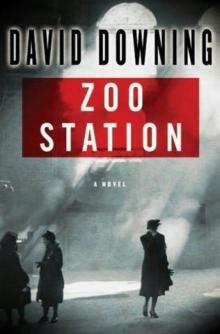 Zoo Station jr-1
Zoo Station jr-1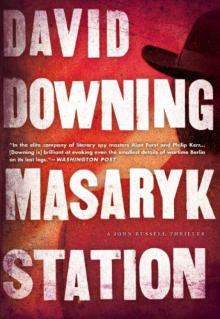 Masaryk Station
Masaryk Station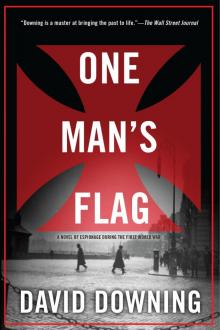 One Man's Flag
One Man's Flag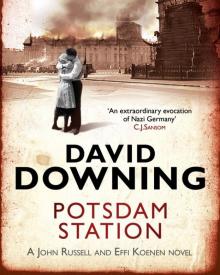 Potsdam Station jr-4
Potsdam Station jr-4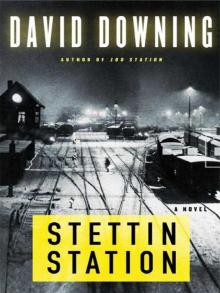 Stattin Station jr-3
Stattin Station jr-3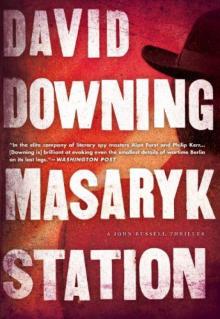 Masaryk Station jr-6
Masaryk Station jr-6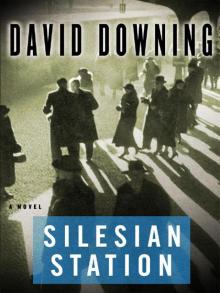 Silesian Station (2008) jr-2
Silesian Station (2008) jr-2 Jack of Spies
Jack of Spies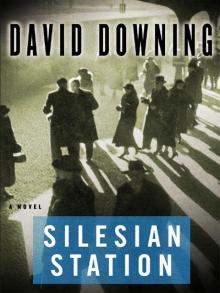 Silesian Station (2008)
Silesian Station (2008) The Moscow Option
The Moscow Option The Red Eagles
The Red Eagles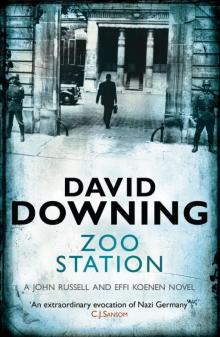 Zoo Station
Zoo Station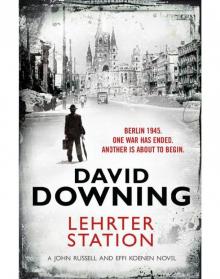 Lehrter Station
Lehrter Station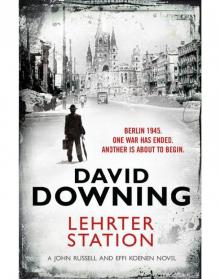 Lehrter Station jr-5
Lehrter Station jr-5